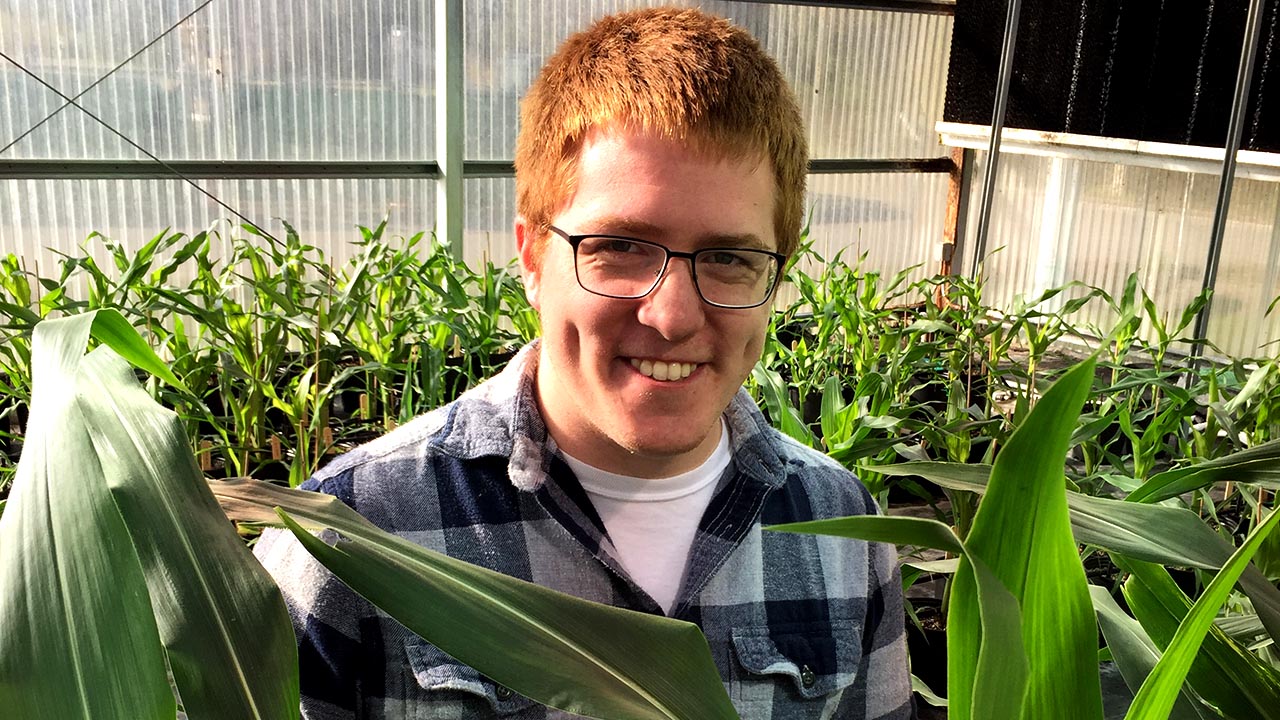- YouTube
- TikTok
OU alum Jacob Corll earns recognition in scientific journal
Research was supported by $897,722 grant from National Science Foundation

Jacob Corll, an Oakland University alum whose research led to the discovery of a master gene that regulates the expression of other genes involved in the development of corn kernels, was recently recognized as the co-first author of a manuscript published in The Plant Cell, a monthly peer-reviewed scientific journal published by the American Society of Plant Biologists.
“This is my first time really being published, so it’s an exciting opportunity for me,” said Corll, who recently earned a master’s degree in biology at OU. “The Plant Cell is a quality journal and I think our work represents what they strive to express and bring to the scientific community.”
According to Dr. Shailesh Lal, a professor of biological sciences at Oakland University and one of Corll’s mentors, being recognized published in the journal, particularly as a leading author, is an honor usually reserved for Ph.D. or postdoctoral research students.
“The Plant Cell is the highest impacting journal published in fields related to plant sciences in the world, and it is quite a recognition for Jacob (then a graduate student at OU) to achieve this honor at the master’s level,” he said.
Corll’s research was supported by the National Science Foundation (NSF) via a collaborative grant for $897,722, which was awarded to Oakland University and the University of Florida.
“The main objective of this grant involved a molecular, genetic, genomic and biochemical approach to studying the networking of genes critical for the development of corn kernels,” said Lal, who serves as a principal investigator on the project, along with Dr. Mark Settles and Dr. Brad Barbazuk of the University of Florida.
“Since corn is the most economically important plant in the U.S., understanding the genes involved in the development of kernels may not only lead to a better understanding of development genes, but also enhance our ability to genetically engineer corn in the future for better yield in both quality and quantity,” Lal added.
In addition to Lal, Settles and Barbazuk, Corll collaborated on the research paper with Donya Shodja, Christian Brigolin and Amy Siebert of Oakland University, as well as Fang Bai, Ruth Davenport, Guanqiao Feng, Janaki Mudunkothge, Federico Martin, Gertraud Spielbauer, and Chi-Wah Tseung of the University of Florida.
“The gene we were studying is called RNA Binding Protein 48, or RBM48,” Lal said. “This gene is actually very important to the normal development of corn. If you destroy it, the kernel become mutated to the point where it can’t even germinate properly. Interestingly, the tissue of the developing mutant defective kernel show abnormal and proliferative growth upon tissue culture mimicking cancer in humans.
“Since a human ortholog or a similar gene to this master corn gene can also exist in humans, our preliminary data finds significant biomedical implications of this gene involving cancer in humans,” Lal added.
Corll said he is grateful to have been a part of the research team, and for the opportunities he was provided while attending OU.
“Working in Dr. Lal’s lab, I got the opportunity to really test myself on my own and sort of learn how to figure things out,” he said. “I think that, along with Dr. Lal’s oversight, really helped define me as a scientist today. It was a big growth period in my life.”
As part of the grant, Corll also had the opportunity to work in a lab at the University of Florida, and he will be pursuing his Ph.D. there in the fall.


 May 10, 2019
May 10, 2019